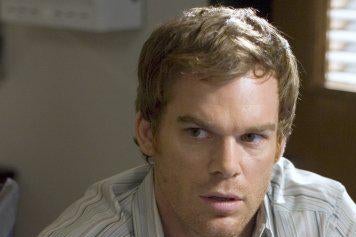Many fans of Showtime’s Dexter seem to believe that the show’s genius lies in its shock value. The serial-killer as hero pushes our ethical imagination to the breaking point: We’re both enthralled and disgusted. Dexter might win our sympathies for a bit, but ultimately it’s the gulf between who he is (a homicidal psychopath) and who we are (presumably, not) that reaffirms our humanity and keeps us coming back for more.
In this take on the show, Dexter’s more endearing traits—the real affection he feels for his son, the fact that he only kills other murderers—just heighten the final moment of disconnect. The shy smile, the knowing asides (delivered in a hypnotic voiceover that I’ve tried and failed to co-opt for my daily life): It’s all a complex flirtation that drops out from under us when Dexter lowers the welder’s visor and saws into his victims.
But these days, most TV fare is so transgressive that it feels odd to locate any one show’s appeal in its supposedly boundary-pushing perversity. American Horror Story had Connie Britton ravished by a kinky phantom. Boardwalk Empire follows a gang of unapologetic crooks. Some of the lawyers on The Good Wife make the greasy, vaguely pedophilic Rumpelstiltskin in Once Upon A Time look respectable.
Dexter Morgan does not offer mere “shock,” but rather, a very specific kind of escapism. He helps us escape, briefly, the truth about mortality.
This philosophy of Dexter has evolved over time. I used to think I loved him because—well, aside from his golden scruff and air of vulnerability—he made me dream that I, the viewer who got him, could somehow tame him with my understanding. Each episode brought us closer, I thought, to our shared goals: emotional intimacy and release from those pesky homicidal urges (which, by the way, seethed from an isolating and traumatic childhood experience in which our hero watched thugs murder his mother and then spent two days in a seafront storage bin soaked in her blood).
But an op-ed in the New York Times by Jeff Lindsay, author of the books that inspired the TV series, prompted me to reconsider this view. “Serial killers are psychopaths, and current research in brain mapping indicates that psychopaths are born, not made,” he wrote. “You can watch The Texas Chainsaw Massacre 20 times and it will not inspire you to butcher the neighbors.” I found Lindsay’s piece reassuring—to be honest, I had become a little worried about the way Dexter had seemingly desensitized me to his trade. For the uninitiated, Dex follows a very specific ritual for his kills: He strips the victim, lays him on a table, covers him in shrink wrap, takes a blood sample for his trophy collection, and then attacks with the knife. Watching this the first few times was nauseating, morally and physically. Now it barely registers. (Also, I’ve seen enough Dexter to know that the show’s editors tend to leave really graphic shots on the, ahem, cutting-room floor).
So I doubt we fans clear our Sunday nights for Dexter because our revulsion to his killings tells us we’re good people. If anything, the show allows us to play-act at evil through identification with its sympathetic lead. Seduced by Michael C. Hall’s easy grace (his blood spatter analyst deftly straddles the nerd/jock dichotomy), we accept—even eroticize—Dexter’s compulsive violence. And for a thrilling hour or so these fantasy versions of death and cruelty sub in for the real things.
In 1986, social scientists Jeff Greenberg, Tom Pyszczynski, and Sheldon Solomon, drawing on the work of Ernest Becker, proposed “Terror Management Theory,” a conceptual framework built on the idea that human thought and action is guided in a thousand small ways by the fear of death. We are programmed to survive, and yet we know our days are numbered, which can create debilitating fear. We cope, this theory proposes, by embedding ourselves in stories and value systems that seem more permanent than we are. Every time we romanticize sex into “love” or make an “ought” from an “is,” the trio argues, we’re inventing meaning to keep mortality at bay.
Research in TMT suggests that the disgust reaction, which appears alongside stimuli related to the material body (think a luridly explicit porn clip or a photograph of rotting food), actually manifests the fear of death. As our notions of dying get more abstract and mythologized, we should feel less disgust at reminders of our physicality. That’s because we’ve managed to infuse death with meaning, so we’re less scared.
What does this have to do with Dexter? The series is, I think, a sustained romanticization (even fetishization) of death. I personally cannot imagine a Grim Reaper more attractive, clever, unthreatening, orderly, domestic, stylish, or fundamentally ethical than Dexter Morgan. Sure, I hate my mortality as much as the next person, but for some reason I can’t summon up the requisite sense of horror at the thought of lying on this serial killer’s table. Am I transcending my finite nature?
I don’t know, but I can’t wait for Season 7.
